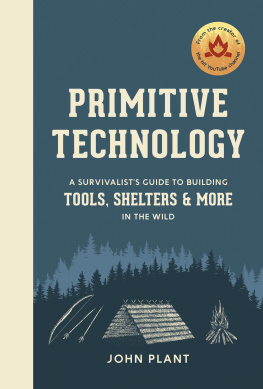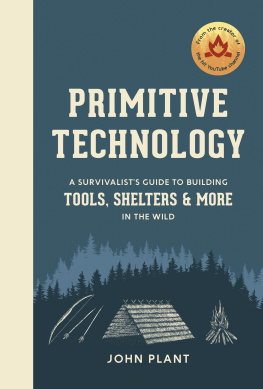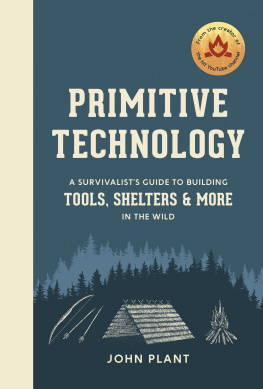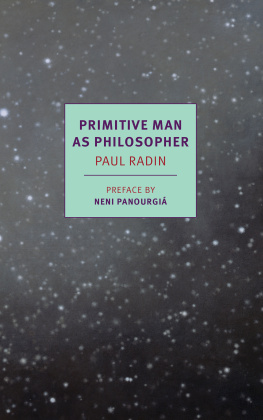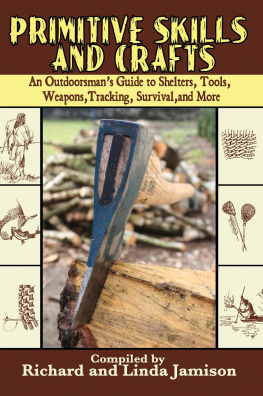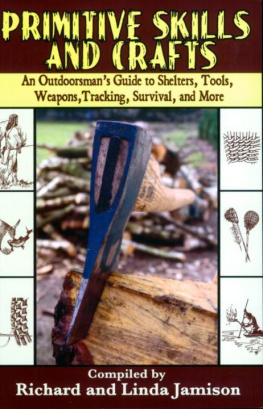PRIMITIVE TECHNOLOGY
PRIMITIVE TECHNOLOGY
A Book of Earth Skills
From the Society of Primitive Technology
Edited by David Wescott
SALT LAKE CITY
02 01 65 4
Copyright 1999 by The Society of Primitive Technology
All rights reserved. No part of this book may be reproduced by any means whatsoever, either mechanical, electronic or digital, without written permission from the publisher, except brief excerpts quoted for purposes of review.
Published by
Gibbs Smith, Publisher
P.O. Box 667
Layton, Utah 84041
Web site: www.gibbs-smith.com
Design by David Wescott
The articles in this book are reprinted from issues 1-10 of the Bulletin of Primitive Technology. The publisher bears no responsibility for their accuracy or content. Neither the publisher or editor bear responsibility for the results of any project described herein or for the reader's safety during participation. Caution and common sense are recommended for every activity.
Library of Congress Cataloging-in-Publication Data
Primitive technology a book of earthskills / edited by David
Wescott
p. cm.
Selection of articles from the Bulletin of primitive technology,
issues 1-10
ISBN 0-87905-911-7
1. Industries, Prehistoric, 2. ArchaeologyExperiments.
3. ArchaeologyMethodology. I. Wescott. Daved, 1948- .
II. Bulletin of primitive technology.
GN429.P75 1999
930.1dc21
98-54428
CIP
Contents
Cover photo by Mike Peters
The 1996 Editorial Board of the Society of Primitive Technology who authorized publication ofPrimitive Technology: (clockwise from left rear) Margaret Mathewson (OR); Managing Editor, David Wescott (ID); Vice Presidents, Maria Louise Sidoroff (NJ) and Scooter Cheatham (TX); Treasurer, Jack Cresson (NJ); Jim Riggs (OR); Founding President, Errett Callahan (VA); and current President, Steve Watts (NC);
'Foreword
THE SOCIETY IS FOUNDED
During the weekend of November 11-12, 1989, ten leaders in the field of experiential primitive skills gathered around the fire at the Schiele Museum's Center for Southeastern Native American Studies in Gastonia, North Carolina to organize a new national organization The Society of Primitive Technology.
Conceived by Dr. Errett Callahan, pioneering reconstructive archaeologist and director of Piltdown Productions in Lynchburg, Virginia; the society seeks to promote the practice and teaching of aboriginal skills, foster communication between teachers and practitioners and set standards for authenticity, ethics and quality.
In his book, Ever Expanding Horizons, Carl Swanson notes; The linkage between biological and cultural evolution is an arena entered only at some considerable risk because it is middle ground. This is the same feeling we had when we established the Society of Primitive Technology; we were attempting to reach a middle ground.
Coming to a balanced consensus between scientists, teachers, practitioners and experiential learners is no simple task. However, Swanson has led us to an understanding of the similarities within the family of man and has founded these similarities in what he calls sociogenes, identifying those ideas that mature into shared concepts and interact with the expressed information encoded in DNA. After all, for 99% of human history our ancestors shared a technological phase called the stone age. We all have sticks and rocks in common.
He looked upon us as sophisticated children- smart but not wise. We knew many things, and much that is false. He knew nature, which is always true.
Saxton Pope, Ishi_In_Two_Worlds
Why Primitive
The very word has come, to many, to connote brutishness or backwardness. That is only one interpretation of a very formative word. Look at the dictionary definition:
primitive (prim'e-tiv)-1a. Of or pertaining to an earliest or original stage or state. b. Archetypal. 2. Characterized by simplicity or crudity; unsophisticated: primitive weapons 3. Of or pertaining to early stages in the evolution of human culture: primitive societies.
The negative words that stand out are crudity and unsophisticated. But when we look closer at these words used to define primitive, the definition of the word takes on a new light.
sophisticate (se-fis'-ti-kat) - 1. to cause to become less natural or simple; especially to make less naive; make worldly wise. 2. to corrupt or pervert; adulterate; no longer pure. 3. to make more complex or inclusive. GREEK- sophistikos-from. -ed- having acquired worldly knowledge or refinement;lacking natural simplicity or naivite. -sohistry- a plausable but misleading or fallacious argument; faulty reasoning.
I, for one, w ould much rather be labeled primitive than sophisticated. Primitive implies first not worst. When looking at the degree of understanding and mastery of manipulation of simple materials to solve complex problems, we moderns have no advantage over those who, by design, choose to live a simpler life.
As our technological society rushes headlong to its dubious future, a new interest in primitive peoples has sprung to life... There have been thousands of societies on this planet and some of them hold secrets that we could well learn from. It is those secrets we are looking for.The challenge of the Primitives
Why Technology
Many of the skills and methods presented in this text come from years of trial and error and personal discoveries by the authors. The benefit to you is that many secrets have been unlocked and are available through this collection of ideas and techniques. It is not our intent to give you shortcuts to what it may have taken decades for others to perfect, but merely guides to show you where they've been and how you can follow. As you can see, this book is not just a skills book. The technologies that are included are here to help you go through some of the same evolution as those who teach them. Listen to their words, and discover the process, not just the product.
The rediscovery of traditional skills and technologies brings a deeper appreciation for the people, places, and spirit of the times that laid the foundation of what we know today as a lifestyle. The mastery of primitive skills comprises two factors - the method and the technique. The method is in the mind; the technique in the hands. Method is the logical manner of systematic and orderly processes, using a preconceived plan. Technique is the application of method (Crabtree). You have the mental capacity to grasp many of these universal principles without much effort due to the inheritance of thousands of years of experience. Unfortunately the last few hundred years have caused us to atrophy, as lifestyle has allowed technology to take over many of the very tasks that shaped us (We need to recognize that it is not the tool, but the inappropriate or overuse of the tool that has put us in this fix. There is nothing wrong with technology, more simply it is the inappropriate use of technology or the proliferation of inappropriate technology). It will take effort on your part to regain the skill and technique needed to master some of these arts, but isn't that the challenge?


